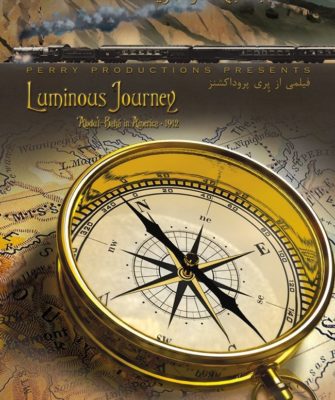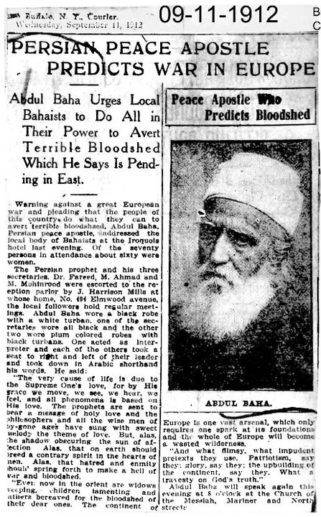



Source: The Promulgation of Universal Peace
5 September 1912 | Talk at St. James Methodist Church Montreal, Canada
Throughout His travels in Europe and North America, ‘Abdu’l-Bahá frequently spoke of the age-old prevalence of warfare, made infinitely more deadly by twentieth-century science, and of the need to “unlearn the science of war” and to create the social conditions and the international political instruments necessary to establish peace. “The greatest catastrophe in the world of humanity today is war,” He told an audience in Montreal in September 1912:
“Europe is a storehouse of explosives awaiting a spark. All the European nations are on edge, and a single flame will set on fire the whole of that continent. Implements of war and death are multiplied and increased to an inconceivable degree, and the burden of military maintenance is taxing the various countries beyond the point of endurance. Armies and navies devour the substance and possessions of the people; the toiling poor, the innocent and helpless are forced by taxation to provide munitions and armament for governments bent upon conquest of territory and defense against powerful rival nations. There is no greater or more woeful ordeal in the world of humanity today than impending war. Therefore, international peace is a crucial necessity. An arbitral court of justice shall be established by which international disputes are to be settled. Through this means all possibility of discord and war between the nations will be obviated.”
30 May 1912 | Talk at Theosophical Lodge Broadway and Seventy-ninth Street, New York
Abdu’l-Bahá was also critical of the radical forms of patriotism and nationalism prevailing in Europe which would ultimately lead to warfare and conquest: “Governments, for instance, consider militarism as the step to human progress, that division among men and nations is the cause of patriotism and honor, that if one nation attack and conquer another, gaining wealth, territory and glory thereby, this warfare and conquest, this bloodshed and cruelty are the cause of that victorious nation’s advancement and prosperity. This is an utter mistake.”
He asked the audience to: “Compare the nations of the world to the members of a family. A family is a nation in miniature. Simply enlarge the circle of the household, and you have the nation. Enlarge the circle of nations, and you have all humanity. The conditions surrounding the family surround the nation. The happenings in the family are the happenings in the life of the nation. Would it add to the progress and advancement of a family if dissensions should arise among its members, all fighting, pillaging each other, jealous and revengeful of injury, seeking selfish advantage? Nay, this would be the cause of the effacement of progress and advancement. So it is in the great family of nations, for nations are but an aggregate of families. Therefore, as strife and dissension destroy a family and prevent its progress, so nations are destroyed and advancement hindered.”


![]()
![]()
Whether you are exploring the Bahá'í Faith or looking to become an active member, there are various ways you can connect with our community.
Please ensure that all the Required Fields* are completed before submitting.